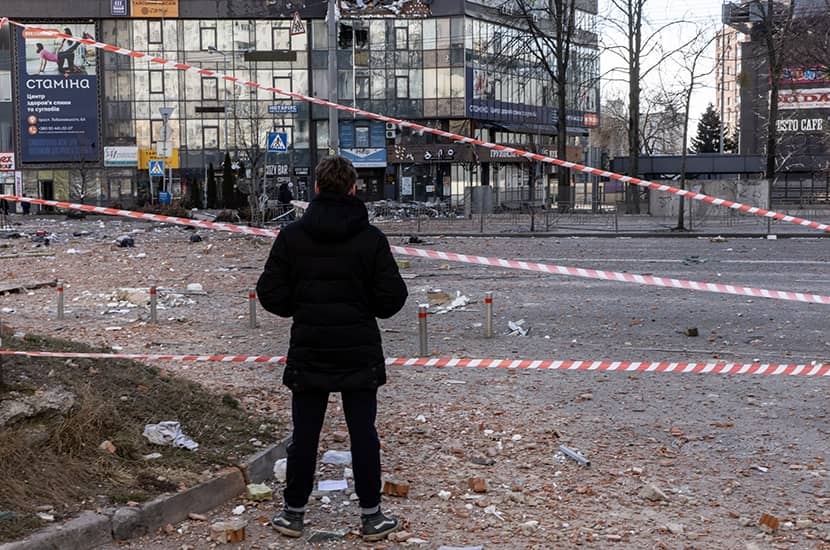Berehove, Ukraine
Central to the question of whether or not Ukraine can survive as an independent state is that of re-supply, not just of drones and anti-tank weaponry but also of food, especially if the conflict lasts for months or even years. The vast agricultural center of the country is not being seeded, with potentially catastrophic consequences. NATO governments are providing lethal weapons and other aid, of course, but from what I have just seen in Berehove in western Ukraine there is another very heartening sign. For there is a large underground network of private, non-governmental groups — largely based on Christian groups with long-established family connections — that is transporting huge amounts of food and other non-lethal supplies into Ukraine. They are not taken by HGVs that can be targeted from the air, but by van, and they are driven by extremely brave Ukrainians and Hungarians — often women — who take them as far eastwards as they can go. I thought of myself as a somewhat cynical old hack, but I was profoundly moved by their courage. Organizations like the Order of Malta, Order of St John and One Mission Society do truly wonderful work here, but it will be these more shadowy groups that will matter most should the Russians ever reach Ukraine’s western border. Unlike other NGOs run by volunteers, these groups are near-impossible to infiltrate because the relationships between the members tend to go back decades, generating a trust and loyalty that the new organizations coming here, such as the UNHCR and Red Cross, would be hard put to replicate.
As I heaved large crates of margarine, tea, noodles, pasta and water from warehouses into the waiting minivans, I recalled the words of Zsolt Németh, the chairman of Hungary’s parliamentary Foreign Affairs Committee, to me the day before: “You might have come to lecture on World War Two, but you’re good and early for World War Three.”
CNN and the BBC seem to only ever use the word “flee” to describe refugees, despite its implication of running away in panic. That was not what I saw at Beregsurány, one of the five border crossings on the Ukrainian-Hungarian border. Of course there has been some panic in the railway stations in the east, especially during Russian shelling, but for the great majority of the two million people who have left, it has been a well-organized evacuation. Ukrainian men bid emotional farewell to their elderly parents, wives and children before turning around and resolutely heading off eastwards to fight, pleased that their families are safe. One is not supposed to praise manliness in modern society, but there is no other word for what is happening here, and it is not “toxic” but uplifting. So when Yalda Hakim states on BBC World that “Because of martial law, Ukrainian men are being forced to fight,” that is in large part wrong, and underestimates the willingness of ordinary Ukrainians to repel the invader.
Two Ukrainians from Berehove, whom I will call Janos and András, posited the possibility of a partition of Ukraine into a western half centered on Lviv (which they call Lemberg) and an eastern part ruled by a pro-Russian puppet. They didn’t want it to happen, and didn’t think it would while President Zelensky still breathes, but it’s being discussed, at least in Subcarpathia.
I wonder whether Zelensky’s deliberate and sublimely moving paraphrasing of Winston Churchill in his speech to Britain’s Parliament might douse the ardor of those revisionists who argue that Churchill has no relevance in the modern world, and that he should not be used to illustrate present-day political points. There have been three books that have put forward this ludicrous theory recently, and another is on its way. Fortunately, the most popular and bravest statesman in the world today doesn’t seem to have taken much notice.
I usually use my Spectator diaries for appalling name-dropping that invites parody, but you’ll excuse me if on this occasion it’s impossible, when one has seen a Ukrainian orphanage where no fewer than fifty-eight children have arrived in the past two weeks, newly orphaned by Vladimir Putin. If ever there were a moment for someone to gain global renown that would last 500 years, it would be his assassin. Tyrannicide was hailed as a high virtue in the ancient world, and the lovers Harmodius and Aristogeiton were lauded for centuries after they killed the tyrant Hipparchus at the 514 BC Panathenaic Festival. Maybe one of those double-agents in the FSB who we read about might do the job. Imagine the irony if he used novichok.
This article was originally published in The Spectator’s UK magazine. Subscribe to the World edition here.

























